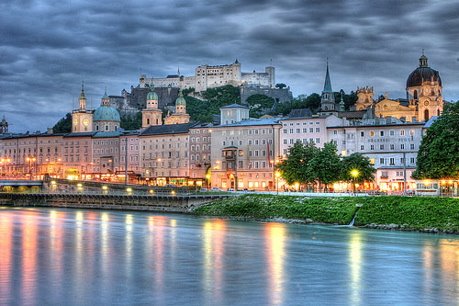 Sundays in Austria are deader than a doornail as we say up in Maine. If you haven't shopped for Sunday, you're out of luck. There's nothing open aside from gas stations and their little shops, but you have to be mighty hungry to buy anything there since the prices are outrageous. In the time we've been here, we've only ever bought coffee cream at a gas station on a Sunday, and it wasn't even good.
Sundays in Austria are deader than a doornail as we say up in Maine. If you haven't shopped for Sunday, you're out of luck. There's nothing open aside from gas stations and their little shops, but you have to be mighty hungry to buy anything there since the prices are outrageous. In the time we've been here, we've only ever bought coffee cream at a gas station on a Sunday, and it wasn't even good.I appreciate that stores are closed on Sunday, that a country as a whole considers it important enough to mandate a break for everyone. I appreciate it, but I don't like it.
If you go away for the weekend and don't plan for your Sunday return, you're not happy. If you like to have fresh rolls daily, you're not happy. Yes, open restaurants can be found seven days a week, but that's not an option for every meal!
I should consider myself lucky. When I was a kid and traveling with my mother to Germany, it was much worse. During the week, stores, the post office, you-name-it closed daily from 12:00 to 2:00 p.m. Supermarkets were not a thing 25 years ago. Instead, there were mom-and-pop groceries and they closed. Then everything closed again at 6:00 p.m.
Originally, everything was closed on Saturday as well just as it is today on Sunday. Then the change-over began. They introduced Saturday mornings. You could shop until noon now on Saturday. Yipee! The entire weekend wasn't shot after all. Jobless teens like me could shop (although we didn't have money). People who had to work no longer necessarily had an entire weekend off.
Then German state after state introduced "langer Samstag." The first Saturday of the month would be like a "normal" work day. People could shop longer...unless they had to work.
Then the work week was affected. "Langer Donnerstag" was introduced. Each Thursday, stores would stay open until 8:00 p.m. Now people who worked all day could shop after work on the weekday...unless they had store jobs and had to work the later hours.
Then state after state said the heck with half-day Saturdays. "Langer Samstag" became every Saturday. For the first time, schedules were introduced where people no longer had two consecutive days off a week.
Then it went back to the work week. "Langer Donnerstag" wasn't enough. Soon Thursday turned to two days a week, then eventually five days a work week. Germans and Austrians could shop, shop, shop...unless they had to work later shifts.
Every year, many states vote on the right to decide whether they can have stores open on Sunday. It's still a nation-wide mandate in Germany and Austria that Sonnday remain a "Ruhetag" or a day of rest. The idea is that there should be one day guaranteed for most people that they have a day off from work and school so that the family can be, well, a family.
Many believe it's a matter of time before Sonntag Ruhetag goes the way of the other supposedly sacred days off. While I don't like not being able to buy fresh bread on Sundays, I do like the fact that retail workers aren't being forced to work on a day when the kids are home from school. Germans have a 37 1/2 work week the last I checked, and they're one of the least likely Europeans to say "yes" to the option of working overtime hours. The reason they give most always has to do with the family.
If these countries do decide to do away with Sonntag Ruhetag, I think it'll be a sad day. Because there's no turning back. If you mention the term "Langer Samstag" to a German or Austrian college student, you might as well be talking about the ancient Greeks!

